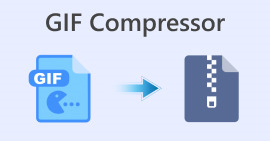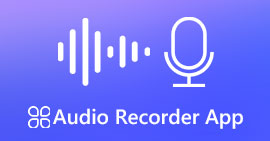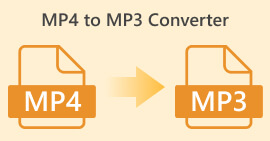Available Audio Compressors Methods You Should Consider Using
Technology advances and audio file demands also upgrade. They are now higher in bitrate, achieving that clear and crisp sound for a superb listening experience. It goes hand in hand. As people demand quality audio files, the audio file's size goes higher. On the other hand, some factors affect the size of the audio file, leading to a larger file size. That includes the bitrate, file format, audio length, sample rate, number of channels, bit depth, and many more.
Most audio files tend to be larger in file size. Hence, many users are looking for ways to compress audio files for sharing purposes. That is because uploading files online limits the upload size. Also, you need to save space on your storage. Regardless of the purpose, you can use audio compressors to help you achieve that smaller file size. We listed them below for you to check.

Part 1. Best Audio compressor Offline
1. Video Converter Ultimate
The first on the list we have is Video Converter Ultimate. It is an easy, secure, and professional audio file compressor that works on multiple platforms, such as Windows and Mac operating systems. One can compress a wide range of audio files, including MP3, AAC, WMA, WAV, etc. Additionally, the options you can modify to compress your files include the size itself, format, channel, sample rate, and bitrate. These are the contributing factors that make a file size big or small. Nevertheless, you can edit them using this program. On top of that, the tool offers more useful features. You may also adjust the volume of the audio or cut and delete parts of the audio file.
Free DownloadFor Windows 7 or laterSecure Download
Free DownloadFor MacOS 10.7 or laterSecure Download
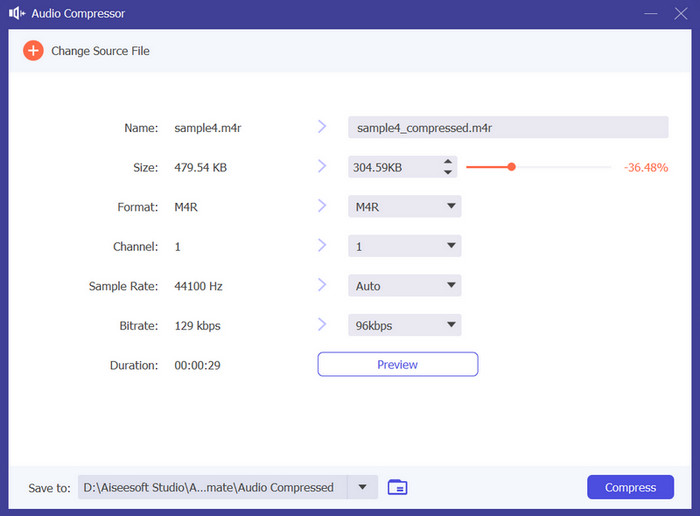
Supported Formats: MP3, MP2, AAC, WMA, M4A, RAM, OGG, AIFF, APE, and FLAC.
Pros
- It allows for boosting the audio volume.
- Edit, trim, cut, and delete the audio portion.
- Reduce file size by 90-98% without quality loss.
Cons
- It does not allow for batch compression.
2. Monkey’s Audio
If you are looking for another tool that can help you compress WAV or other audio files, look no further than Monkey’s Audio. The tool is infused with Cyclic Redundancy Check, also known as CRC, which detects errors in the data or audio file caused by corrupted file transmission internally or externally. This feature ensures that the loss of sensitive information is prevented. Besides that, the tool also serves as an audio organizer for your collection of music.
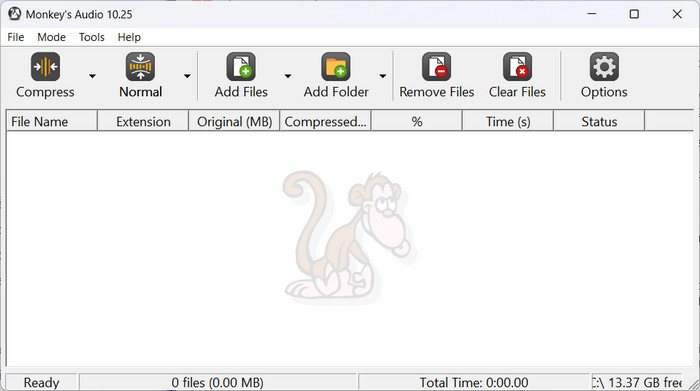
Supported Formats: ALAC, FLAC, Shorten Files, TAK, and WacPack Files.
Pros
- Tagging of music files is allowed.
- It supports popular players and rippers, like Winamp.
Cons
- The tool is not compatible with Mac operating systems.
- More CPU is needed when processing files.
3. Freemake Audio Converter
Freemake Audio Converter is a well-known program that allows for shrinking and downsizing audio files. Likewise, you can edit the settings, such as codecs, sample rate, frame rate, and channels. The best part is it supports predefined formats for different devices, including MP3 players, PC, mobile phones, and tablets. Plus, uploading music to cloud storage platforms is a good feature this audio compressor offers.
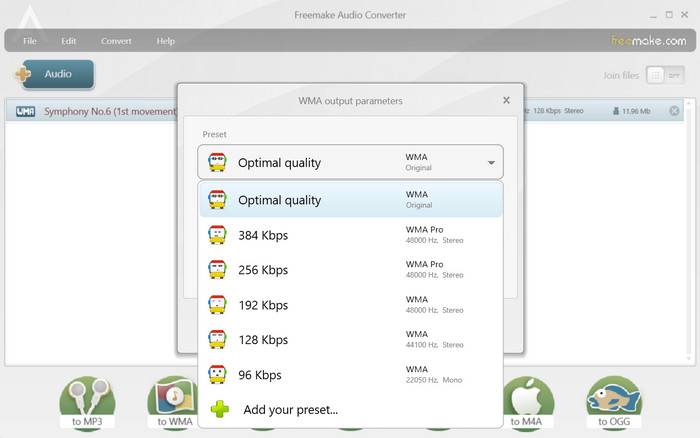
Supported Formats: MP3, WAV, WMA, FLAC, AC3, AAC, M4A, OGG, and AMR.
Pros
- Compress audio files by batches.
- Merge or join audio files.
Cons
- Audio files with a duration of more than 3 minutes cannot be loaded.
4. Audacity
Another famous audio editor and compressor is Audacity. This compressor for MP3 and other formats make it easy for different platforms to compress files with ease. The tool is compatible with Mac, Windows, and Linux. Furthermore, it is an open-source program, meaning everyone can utilize it without a cost, totally free. Of course, the code is available for all users, which is one of the benefits of an open-source program.
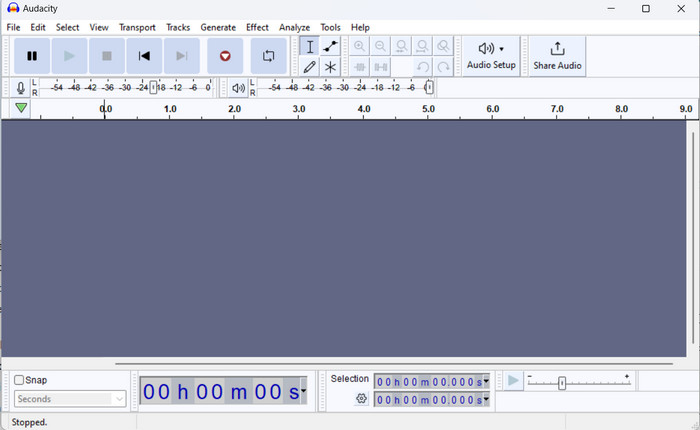
Supported Formats: AUP3, AUP, WAV, AIFF, uncompressed types, OGG Vorbis, MP3, WavPack, and FFmpeg.
Pros
- Run and maintained by an active community of developers.
- It offers a good amount of control over compression parameters.
Cons
- It only facilitates basic compression functionality.
- Real-time visualization is lacking.
5. Ashampoo Zip Pro
Ashampoo Zip Pro is a program with several unique capabilities for encryption, sharing, compression, and extraction. It can convert audio not only to MP3 but also to other formats. As a bonus, the audio file compressor has an integrated file explorer and backup support. The software also provides options for sophisticated compression file types. One disadvantage is that it is difficult to navigate, especially for beginners.
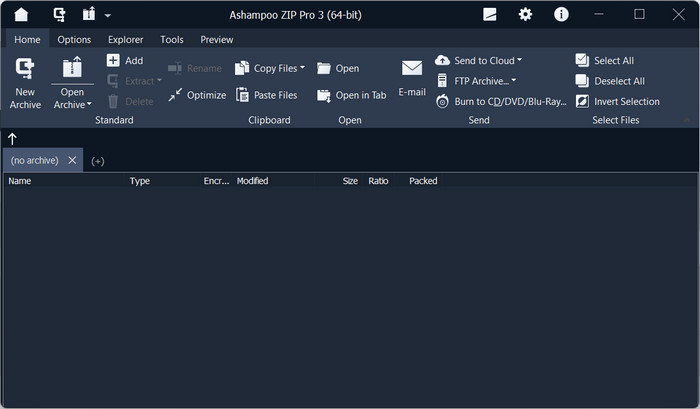
Supported Formats: MP3, WAV, WMA, FLAC, etc.
Pros
- It supports multiple languages.
- Very clear and neat user interface.
- Compress audio files in professional grade.
Cons
- The tool is quite expensive compared to other tools.
- The trial version only lasts for 10 days.
Part 2. Top Audio Compressor Online
1. YouCompress
If you are looking for audio compressors online, you might have bumped into YouCompress. The program has the ability to reduce the file size of your audio files without leaving your browser. Additionally, you can maintain the quality of your audio files even after processing them using this utility. On top of that, one can compress audio files in batches.
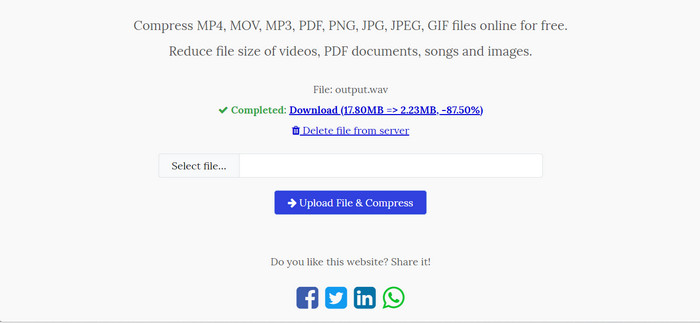
Supported Formats: MP3, MP4, MOV, PDF, PNG, JPG, JPEG, and GIF.
Pros
- Shrinking the file size of an MP3 file can be done with just a click away.
- It does not limit the quantity of files a user can compress.
- It encompasses MP4, MOV, PNG, JPG, JPEG, MP3, GIF, and PDF for compression.
Cons
- It does not allow users to customize settings for compression.
- It is only used for MP3 audio files alone.
2. MP3Smaller
MP3Smaller is another yet worth the try program to reduce the file size of your music files. Its UI is user-friendly since it offers a wealth of helpful information and instructions on how to utilize it efficiently. Additionally, you may use this application to reduce the file size of your MP3 without actually editing or trimming it. It can, therefore, export the file while maintaining the original quality and enables uploading files up to 150MB in size.
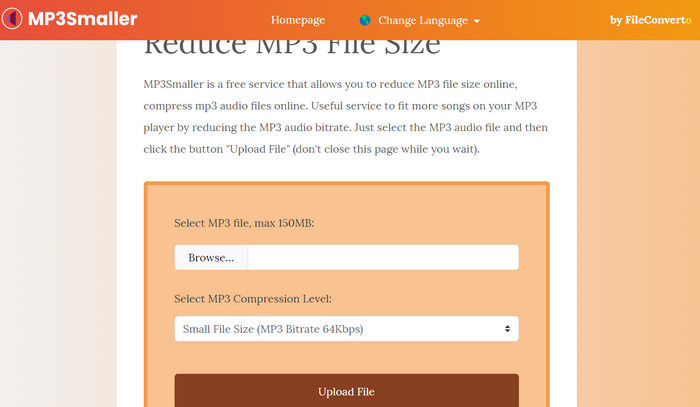
Supported Formats: MP3 Audio File
Pros
- Compress MP3 files in different bitrates.
- No need to sign-up to access the tool.
- Freely accessible to all users free of cost.
Cons
- Compressing audio files is handled one at a time.
- Limited audio file size to upload.
3. Online Audio Converter
Online Audio Converter is also a reliable program when you need to compress audio files online that also works as a compressor for MP3 files. Upon using the tool, the interface is pretty straightforward, and you can get used to the process in no time. Moreover, it comes with advanced settings that enable you to edit different parameters to further shrink the audio file size. What we also like is that it has a quality progress bar to facilitate the compression level. On top of all that, you can edit the track information of your music file, like metadata or file name.
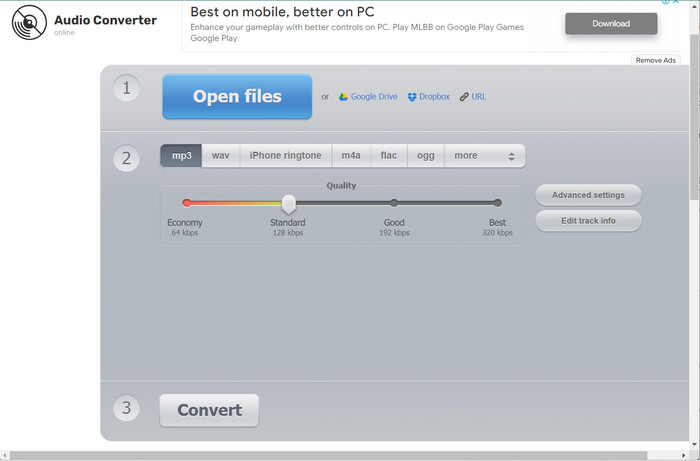
Supported Formats: MP3, WAV, iPhone ringtone, FLAC, OGG, and M4A.
Pros
- The program is available in almost all web browsers.
- Upload files from various sources, like local storage, Dropbox, Google Drive, etc.
- Adjust quality and bitrate to further shrink the file.
Cons
- Adverts are present on the page of the program.
4. Online Converter
Another good recommendation for audio compressors that you should take advantage of is Online Converter. This free audio compressor is a compressor as well as a flexible converter. It allows you to load source files via the web or straight from your PC. You have total control over the compression ratio as a result of this. After you've submitted the files, you may manually set the soundtrack's output size. Not only does it offer an audio converter but also an image converter, video converter, ebook converter, and so much more.
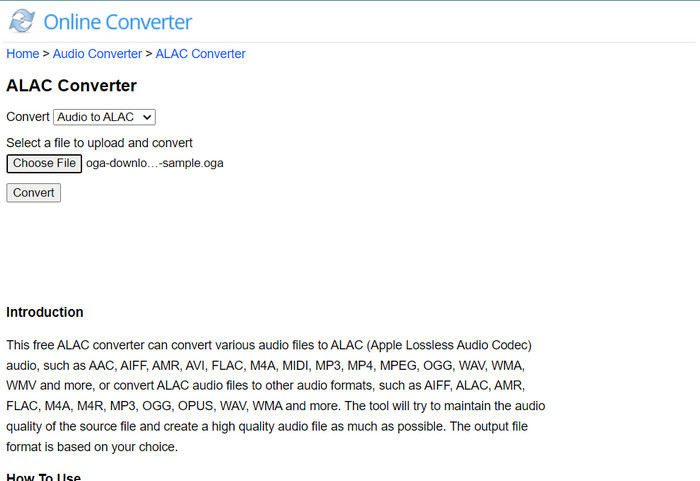
Supported Formats: MP3, AIFF, ALAC, AMR, FLAC, M4A, M4R, OGG, OPUS, WAV, and WMA.
Pros
- A lot of advanced tools are offered.
- Repair, trim, adjust volume, and joining audio are possible.
- Extract audio from the video.
Cons
- Lacks of visualization for the process.
- Adverts keep on showing up on the page.
5. FileZigZag
A free online converter and audio compressor, FileZigZag, supports a variety of file types and formats. It is well-known for having numerous, varied feature sets. This online audio compressor is superior to most shareware and supports a wide range of file types. FileZigZag is a versatile web program that can do more than just compress music. It can also convert images, videos, archives, and many more.
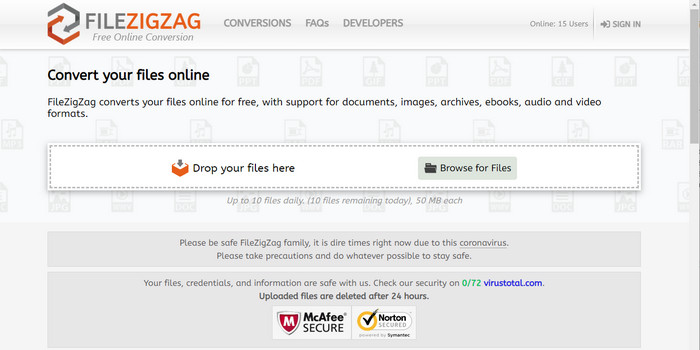
Supported Formats: MP3, AAC, AMR, FLAC, and OGG.
Pros
- It can process audio files in batches.
- It can perform multiple conversion tasks.
- Drag-and-drop interface for uploading.
Cons
- There are only limited files you can process daily.
- 50MB for each audio file is the maximum file size upload.
Further Reading:
Video File Compressors for Offline, Online, and Mobile Users
5 MP3 Cutters to Cut Any Audio Easily [2023 Updated]
Part 3. FAQs about Audio Compressors Online
What is an audio compressor?
An audio compressor, in the context of software, is a digital tool used for controlling the dynamic range of audio signals in various audio production and editing applications. It works similarly to hardware compressors but within a digital environment. Audio compression software allows you to adjust the loudness and dynamics of audio by reducing the volume of louder portions while boosting quieter parts.
What are the best settings for an audio compressor?
The ideal settings for an audio compressor can vary depending on the specific audio source and the desired effect, but here are some general guidelines. Threshold: Set the threshold to determine when compression starts. It's usually adjusted to match the level of the audio source. Ratio: Common ratios are 2:1, 4:1, or 8:1. A 4:1 ratio is often a good starting point for gentle compression. Attack Time: Adjust the attack time to determine how quickly the compressor responds to levels exceeding the threshold. For vocals, a medium attack time of 10-30 milliseconds is a reasonable starting point. Release Time: The release time controls how long the compressor takes to stop reducing gain after the audio level falls below the threshold. For vocals, a release time of 100-300 milliseconds is typical. Makeup Gain: After compression, you may need to add makeup gain to restore the lost volume and achieve the desired output level.
What is the difference between a compressor and a limiter?
A software compressor is designed to control the dynamic range of audio signals by gently attenuating the volume of sounds that exceed a set threshold. It allows for a more nuanced and gradual reduction in gain, which can be useful for dynamic control and shaping the sound. A software limiter, on the other hand, is a more heavy-handed tool that's primarily used to prevent audio signals from exceeding a specific maximum level, known as the ceiling.
Conclusion
Those are the audio file compressors you may utilize. Online tools should help you when you don't want to download software to your PC. On the other hand, desktop programs are there to help you compress audio files even without access to the internet and get the best out of your audio files.



 Video Converter Ultimate
Video Converter Ultimate Screen Recorder
Screen Recorder
